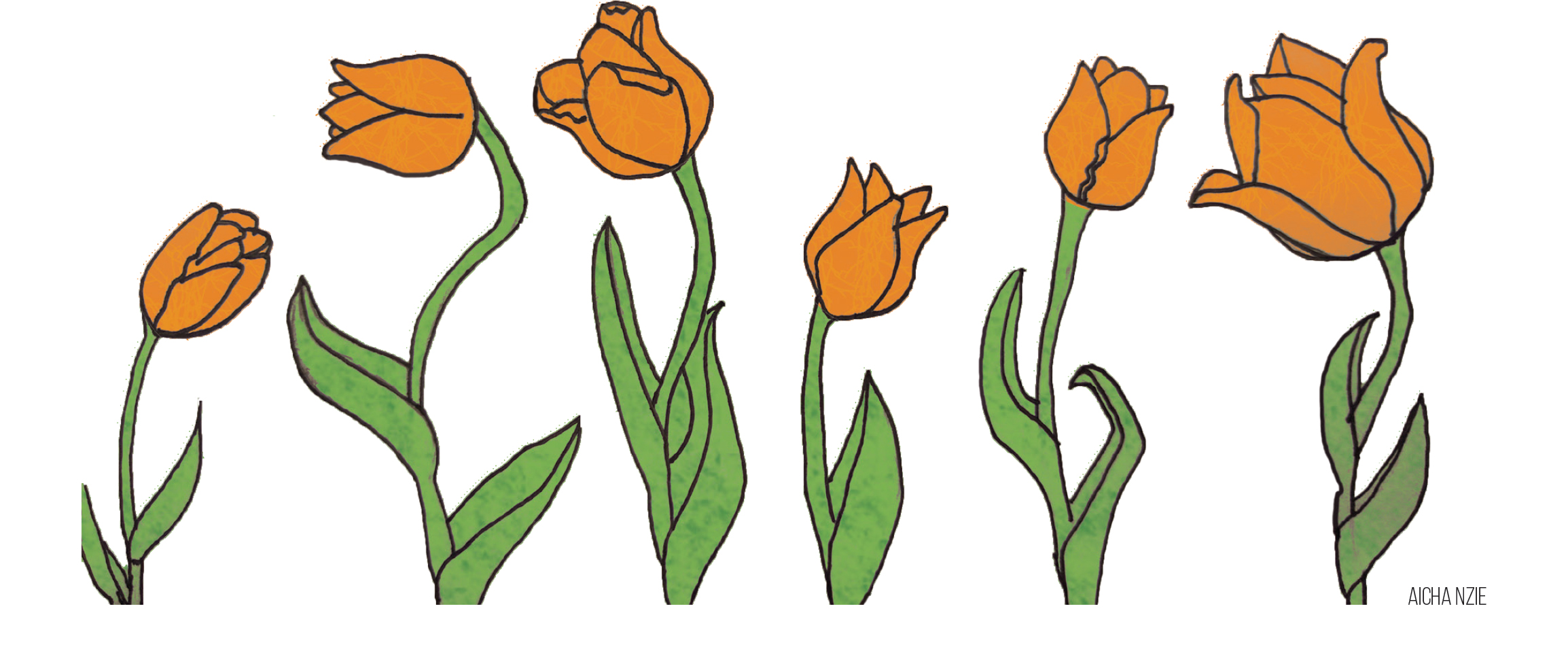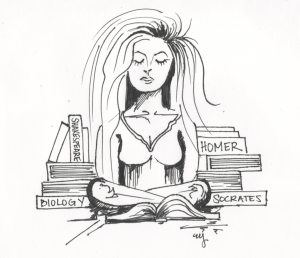I have a picture on my desk from 2006. It shows me in Seattle over spring break visiting my aunt, uncle, and cousins. It is the first time I can remember being there. We did all the touristy things we could. On the coldest and rainiest day of our stay, we all decided to go to the tulip festivals. I imagine my delicate Los Angeles skin was freezing despite my jacket and pants, but there’s no way you’d ever know just by looking at the picture. Mommy and I stand in front of what looks like a never-ending sea of orange tulips, her arms securely around me. The wind blows a little bit of her hair in her face while 7-year-old me has both thumbs up, a big smile on my face, and a hole on either side of my two front teeth where new ones will eventually form.
She died of cervical cancer five years later. It’s the happiest picture I’ll ever have with Mommy, and I’ll cherish it for the rest of my life. We all experience pain in our lives because we all have people we love. Pain is a potential side effect of our closest relationships, a risk we’re willing to take for the pure joy we experience when these relationships go right. But they can just as easily end early, and the issue then becomes how to deal with the pain. It’s always simplest to curl into a ball and hope someone finds you, but even then being found isn’t always enough.
As a 12-year-old dealing with losing his mother, I looked at the warmth and love of her friends to appreciate how compassionate my mother had been. Her book club friends vowed to do a “petite chat” with me and my sisters every two months, a promise they’ve kept years later. (They read Divine Secrets of the Ya-Ya Sisterhood and began calling us “kids” the “petites.” The name stuck.) Her closest friends from her teaching days still do our monthly “Family Nite,” as Mommy spelled it on our calendar. Even her friends who didn’t have as much of a personal connection with me and my sisters helped bring us meals when my mom was going through treatments. Every one of my mom’s closest friends has made it clear to me and my sisters how much we are loved. It was like everyone who ever knew Mommy adopted the three of us.
My sisters and I each have our keepsakes from her: journals in which we wrote back and forth, a graduation dress, an email she wrote to her “amigas” on my first day of middle school, and lots of pictures.
It was my mom’s mom that really helped keep my mother alive for me and my sisters. She was the one who went to the cemetery with us on holidays. We’d decorate my mom’s grave for Christmas. We’d leave her cake on her birthday. And even if it wasn’t a special occasion, we’d always leave her flowers. Whenever we hung out at Papa’s house, Grandma talked to us about how she remembered Mommy. We heard her fondest memories from when our mom was little. We saw pictures and projects she put together. Grandma shared how she had my mom’s arm around her in every picture, how Mommy always smiled, how she always made a point of saying to Grandma, “I love you, Mom.”
Both of them had the same birthday, Sept. 30, a special connection Grandma loved talking about. Our mom was the child who would just know if something was wrong. She was the child who stayed in Los Angeles and would take care of her parents when the time came.
As a young man, you are told, “Boys don’t cry.” We’re supposed to be the strong sex, the ones less affected by emotion. As a boy, I’m “supposed” to be able to bottle up the emotional pain, but that never got me very far.
Losing a parent isn’t a simple cut. It’s not something that you can heal just by slapping on an emotional band-aid. There’s a scar left behind. Even now, over six years later, something will remind me of her and I’ll cry because she’s gone. It happens less now, simply because of the time that’s passed, but it’s still there.
I’ve found that the memories I have of my mother are as vital to reconciling her death as moving on with life is. Looking through pictures of her, I can paint the stories the images represent. For the photos I’m in, I vividly see the day we took them in my mind; for the ones I’m not in, I’ve heard enough stories from my family to piece together the moment encapsulated in the photo. The keepsakes remind me of her personality. In letters that she wrote, I hear her voice, hear her laugh, almost as if she’s reading it aloud beside me.
I look at my sisters and see my mother in them. We all got her eyes, hair, and skin tone. We have the same sort of love in our relationships that she did, all of us living with her same compassion. We’ve taken on the responsibility of keeping her alive for everyone who didn’t get to meet her. If having all of these moments of joy means I cry every once in a while, I’ll take the tears that come with it. I’ve embraced the vulnerability.
As I grew closer to my friends this year, I could tell this was something they all struggled with. My loss isn’t necessarily a secret. One of the two pictures I have on my desk is the one of me and my mom, and a third frame holds a poem about her that my soccer team gave me on my mom’s birthday. My friends here at Georgetown could tell that something had happened, but they were afraid to bring it up in conversations with me. They didn’t know how I would react.
I hadn’t brought up my mom in conversation on my own before. Although she’s an integral part of who I am, I never thought that people would want to hear about her out of the blue. For one thing, it’s a sad topic to bring up; most of the time when I’m talking to friends we’re laughing about something that just happened or making plans for the next couple of days, so that particular aspect of my past seems out of place. And as vital as she is to understanding me completely, it’s something I have always kept close to my chest.
Only those who were very close to me learned about my mom, and that’s mostly after they shared something deeply personal with me. I had to learn they trusted me and I could in turn trust them before I opened up. This year, though, that wasn’t the case. My friends and I got closer together as a group, and I came to trust them to the point that I was ready to share.
This time it was me who initiated, who showed them that I trusted them enough to tell them. I knew that for them to be there for me, they needed to know how I was feeling, how my mom still influences my life, and how my family has an abundance of close friends because of her. They had to know that I was okay crying and answering questions about my mom from them if they had any. They had to understand how I’ve learned to live on my own for them to really be engaged in my life.
I know I’m not the only one who has ever struggled, and I know that there are some here at Georgetown who have been through much harder losses. To those of you who have, maybe you didn’t get through it exactly the same way as I did, but I’m almost sure you made it through in a similar fashion. And if you haven’t, but know someone who has, don’t be afraid to ask them about it. Listen to the stories. Picture the memories. You’ll be surprised how much you learn.
I strive to live my life like my mother did. She embodies all of what I want to become. I’m proud of what I’m able to tell my friends about her. I want to give everyone who meets me a little piece of her to experience. Being able to talk about her and cry about her, just like my Grandma would with me and my sister, is just a part of that.
Jorge is a sophomore in the College.




